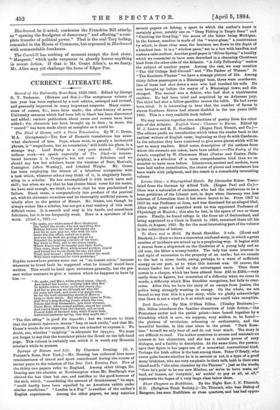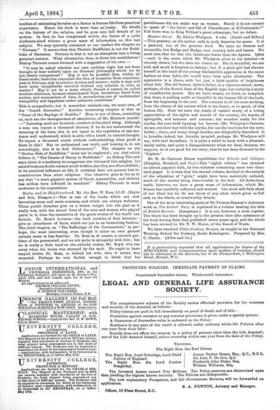tanities of estimating its value as a factor in human
life from practical experience. Hence his book is more than an:essay. He dwells on the history of the religion, and he goes into fall details of its system. In fact, he has compressed within the limits of a quite moderate-sized volume a great mass of information on this last subject. We may specially commend to our readers the chapter on "Nirvana." It seems clear that Theistic Buddhism is not the Budd- hism of Gantama. Nirvana in that is not an absorption into a living personal essence. What alternative, then, is there but annihilation ? Bishop Titcomb comes forward with a suggestion of his own :—
"It may be asked whether our own ruthless logic has not been brought to bear unfairly upon an Oriental philosophy which we do not clearly comprehend ? May it not be possible that, within all these terms, there lies concealed the idea of cessation from conscious- ness in Nirvana, only in relation to time and matter ; while it may still have some inexplicable survival without any relation to time or matter ? May it not be a state which, though it cannot be called sentient existence, because emancipated from sensations, freed from motion, and unconscious of time, is nevertheless one of undisturbed tranquillity and happiness under unknown conditions."
This is sympathetic, but it somewhat reminds one, we must own, of the "fourth dimension." Another interesting chapter is that on '" Some of the Sayings of Buddha." Here is one of them, reminding us, such are the strangenesses of association, of Mr. Matthew Arnold : —" Learning need not be much ; conduct is the chief thing. Although a man can repeat a thousand stanzas, if he do not understand the meaning of the lines, this is not equal to the repetition of one sen- tence well understood, which is able, when heard, to control thought. To repeat a thousand words without understanding, what profit is there in this ? But to understand one truth, and hearing it, to act accordingly, this is to find Deliverance." The chapter on the "Darker Side of Buddhism" must not be neglected ; nor that which follows it, "The Causes of Decay in Buddhism." As Bishop Titcomb says, there is a tendency to exaggerate the virtues of this religion. Its sacred books no doubt contain much wisdom, but they are often childish; in its practical influence on life, it certainly does not present less in- consistencies than other religions. One observer goes so far as to say that "a more gigantic system of fraud, superstition, and idolatry has seldom been inflicted on mankind." Bishop Titcomb is more moderate in his expressions.















































 Previous page
Previous page